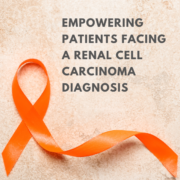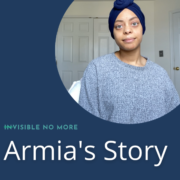What Health Disparities Exist for Patients with Renal Medullary Carcinoma?
This video was originally published by Diverse Health Hub here.
What Health Disparities Exist for Patients with Renal Medullary Carcinoma? from Diverse Health Hub on Vimeo.
Dr. Pavlos Msaouel broaches the disparities that exist for patients with Renal Medullary Carcinoma (RMC). He contends that RMC afflicts a very vulnerable population, that is young African Americans. The disparity exists due to the young age of these patients who aren’t part of a work force with health insurance. Secondarily, this has caused RMC to be underdiagnosed, preventing optimal treatment for patients.
On a global scale, Nigerians face the same disparity, as traits of RMC affect a large number of the population. There are virtually zero reports of its existence and patients again are underdiagnosed. Dr. Msaouel argues we need to research questions that answer where and how RMC affects particular populations in order to equalize the disparity of underdiagnosed patients. Currently the US is gathering data and creating RMC patient communities and advocates. Dr. Msaouel stresses this research is needed on a global scale as well.
Transcript:
Rebecca Law:
Dr. Msaouel, what disparities exist for patients with Renal Medullary Carcinoma?
Dr. Pavlos Msaouel:
Now that is a wonderful and very important question because there are certainly disparities in caring for individuals with RMC (Renal Medullary Carcinoma). Think about it these are people who are young and young people in general — you know they do not have necessarily for example, in the U.S. that kind of insurance when they’re in their twenties or teenagers that they will have later in life or even you know are not part of the work force in that sense. But it’s even more challenging if you think that the vast majority of individuals with RMC are young African Americans. So, this is a disease that particularly afflicts a very vulnerable population, so there is no doubt that health disparities afflict individuals with RMC and this may be part of the reason why for many years this was an underdiagnosed disease.
Dr. Pavlos Msaouel:
We are finding out now that this cancer is more common than we originally thought. It’s still a rare cancer, there is no doubt about that, but it is more common than we originally thought to the point that nowadays in our clinics we see about 1 new case, 1 new patient with RMC per month. So that’s certainly more common than the about 100 cases that have been published thus far in the literature—there are many more that we do not know of. And think about it also in a different way, from a more global perspective. So, there is about let’s say 3 million individuals in the U.S. who carry the sickle cell trait. Most would be African Americans, other ones will be Caucasians so there are many different people who can have the sickle cell trait, but it’s mainly African Americans, but there are 300 million people in the world that carry the sickle cell trait — mainly in Africa.
Dr. Pavlos Msaouel:
So, let’s take for example, Nigeria – there are many people in Nigeria who have the sickle cell trait yet how may reports are there about the existence of this cancer in these countries, essentially almost 0 and so that is a disparity in itself. This is a cancer that can be difficult to diagnose especially if you do not know about it, if you’ve never heard of it, but even if you do – even if a physician or healthcare personnel knows about this cancer it still needs specific tests to be done and many of them cannot be done in most countries so that’s also a disparity.
Dr. Pavlos Msaouel:
So the mere fact that this cancer cannot be diagnosed in many countries in the world is a disparity in itself, so if we were able to correct this and understand more about where it happens and how often it happens we know much more nowadays thankfully through the work of many people in the U.S. now that are becoming passionate about helping individuals with RMC (Renal Medullary Carcinoma) so we are gathering a lot of data, a lot of information, we have patient communities in the U.S., we have patient advocates that help immensely in the U.S, but this is very likely a global phenomenon, so that’s a disparity that will need to be addressed.










